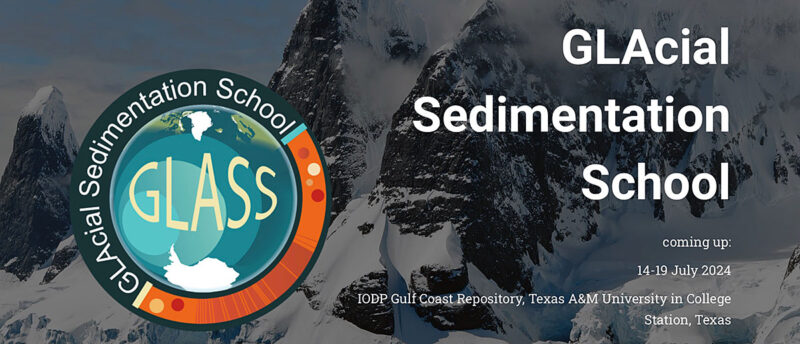Workshop – GLAcial Sedimentation School 2024

Date: July 14-19, 2024
Location: IODP Gulf Coast Repository, Texas A&M University, College Station, TX
Workshop Organizers: Trevor Williams (Texas A&M University), Denise Kulhanek (Kiel University, Germany), Katharina Hochmuth (University of Tasmania, Australia), Larry Krissek (Ohio State University), Mark Leckie (University of Massachusetts, Amherst), Val Stanley (Oregon State University)
Deadline to Apply: The deadline to apply has passed. Invitations to participate are currently being distributed.
Increased understanding of past ice sheet response to warmer-than-present climates is critical to improve models of future climate warming, ice sheet melt, and sea level rise. More accurate predictions are necessary for policy makers to mitigate future impacts of climate change. Sediment cores collected through scientific drilling and coring campaigns provide the opportunity to ground truth past environmental conditions and associated ice sheet response. Over the last few years there have been a number of polar campaigns to collect cores for this purpose, including several International Ocean Discovery Program (IODP) expeditions to the Antarctic (374: Ross Sea West Antarctic Ice Sheet [WAIS] History; 379: Amundsen Sea WAIS History; 382: Iceberg Alley; and 383 [DYNAPACC]), as well as other collaborative projects such as the Thwaites Glacier International Collaboration, SALSA, etc. In late 2022, the IODP drilling vessel JOIDES Resolution will begin operations in the North Atlantic, with Exp. 400 to NW Greenland already scheduled and several other proposals to drill in the Greenland/Arctic region available to schedule in 2023–2024. Additionally, other non-IODP campaigns to Greenland are in progress. Sediment cores collected by these campaigns are crucial to investigate the stability of the Antarctic and Greenland Ice Sheets under past warm environments and to provide analogue scenarios for ice retreat and consequent sea level rise due to future climate warming. To help ensure that research results from these sediment cores yield data required to improve climate and ice sheet models, we host a one-week glacial sediment core school to provide an introduction to Polar paleoclimate research using such cores.
The primary goals of the school are to:
- Train a cohort of young scientists to interpret the stratigraphy of polar marine sediment cores in the context of ice, climate, and source-to-sink processes to improve our understanding of past and future ice sheets in Greenland and Antarctica.
- Prepare young scientists for upcoming Greenland and Antarctic expeditions and for their future research.
- Cultivate the wider polar marine sediments community.
Mornings (Monday–Thursday) will include lectures and an exercise targeted to a daily theme, with afternoons dedicated to hands-on activities in the repository labs. School participants will be divided into ~5 groups and assigned a set of cores. Each day they will collect a different dataset on their cores, rotating through 4 laboratories by the end of the week. The laboratories include macroscopic core description, microscopic (smear slide) analysis, physical property data and downhole logging, and chronostratigraphy (integrating bio- and magnetostratigraphy). On Friday, each group will spend the morning integrating and finalizing results, which they will present in the afternoon.
The application period has closed.






